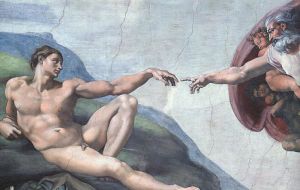Genesis (band)
Genesis (formerly of book in the Bible fame), is an English dadrock band. They were known in the 1970s for playing really boring, lame progressive rock, but gained millions of new fans in the '80s when they switched to chart-topping pop. Genesis got their name from a single word spoken by an anthropomorphic mouse in 1967.
Their lineup consists of frontman/singer/drummer/bank account manager Phil Collins, keyboardist Tony Banks, and bassist/guitarist Mike Rutherford. Peter Gabriel and Steve Hackett are two chaps who were in the band a long time ago, but nobody gives a shit about anymore. Other nobodies who were in the band at some point include Darryl Struemer, Chester Thompson, Chris Stewart, John Silver, John Mayhew, Bill Bruford, and Anthony Phillips.
History[edit | edit source]
1967–70: Baroque era; Formation, Flowers and Public Schools[edit | edit source]
In the beginning, there was a flower in the fields next to Willow Farm. One day, a flutterby called Tony Banks landed on it. This flutterby brought along its musical box and it started to play some damn strange music, which transformed the flower into Peter Gabriel, who started singing. Peter's singing and Tony's playing attracted the attention of some other creatures from Willow Farm, a butterfly called Anthony Philips, a gutterfly called Mike Rutherford, and a random drummer.
Initially, Genesis was a public school boy-band churning out three-minute Protestant hymns about conservatism and how jolly good it was for moral fibre. In 1969, along with producer, caveman and noted pedophile Jonathan King, they recorded the album From Genesis to Revelation, a concept album about the Bible. They also received a kind request from their pedophile manager to rip their entire album off from the Bee Gees and the Moody Blues. Unfortunately, record shops mistakenly placed the album in the "gospel" section due to its title, and as a result it only sold 650 copies (seriously). This led Genesis to the revelation that certain members of the band were about to be fired.
Ant Philips, after being too much of a coward to play in front of an audience, ran away, trespassed Gabriel's personal changing room backstage, left the band and returned to Willow Farm, where he could live a carefree life with the other butterflies. Gabriel climbed to the top of a white mountain, where he spotted a hermit called Steve Hackett playing guitar. Steve's playing was so divine that it caused Gabriel to have visions of angels, although these also could've been caused by LSD. Now the band was just missing a drummer. This was destined to change, however, when a band named Yes refused to let a man named Phil Collins join for not being pretentious enough. Genesis were on the verge of desperation, and decided to let Collins join. Little did they know, however, that they had unwittingly kickstarted Collins' master plan to ruin music.
1971–77: Progressive era; LSD, Robbery, Assault, Battery and Volcano Dancing[edit | edit source]
After spending some time in a nursery committing crymes such as selling LSD to children, Gabriel got a burst of inspiration and foxtrotted over to the studio. There, he told the band he wanted to elevate their music to higher artistic levels and explore the idea of "art rock": rock where the liner notes are more interesting than the actual music. Banks was eager to record new music, since he had just stolen a Mellotron that fell off the back of one of King Crimson's touring trucks and couldn't wait to experiment with it; Rutherford, after watching the skies for inspiration, had also written a few songs; Hackett had stolen a guitar solo from Bach and passed it off as his own (his last writing credit for years to come); and Collins was ready to pound the skins.
Deciding that the world could always use really fucking long songs and more keyboards, Genesis went to work and recorded numerous pieces of tedious, pretentious refuse including "The Knife", "Supper Isn't Ready Yet, Fuck Off And Watch Telly", and "More Tea Vicar?". They soon hit upon the idea of recording 38-minute epic songs about flowers, alien postmen in disguise, and Hitler's penis. In fact, Genesis's music was so weird, twee, and boring that nobody in England actually listened to them. This forced them to tour in places like Italy, where people actually liked their insane music.
In 1975, Gabriel was watching a play about a lamb on Broadway, when he ran into a great-uncle from Puerto Rico. In honour of his Latino heritage, he changed his name to Rael and soon after left Genesis to start a solo career in Latin America. With the departure of Gabriel, Collins's dreams were finally becoming a reality: he was a singer in a (so-called) rock band! He realised that Bill Bruford had never been in Genesis before, and it was tradition for every prog-rock band to hire that man, so he invited Bill to join. However, after just one tour, Bruford left because of Phil's constant whining, and went on to join King Crimson.
With Collins now in charge, Genesis recorded two albums that continued in the vein and grandeur of the Gabriel era: A Trick of the Tail (1976) and Wind and Wuthering (1977). These fell somewhat sort of previous masterpieces, mainly due to Collins not taking enough LSD, Gabriel's main source of inspiration. Hackett was very displeased when he realised that Tony Banks only ever let him play one single guitar solo since he joined the band, "Firth of Fifth". So, he somehow managed to convince Tony to let him record another one, "Blood on the Rooftops." Sadly, Tony then proceeded to mix him out of his own song, and as a result Hackett left the band.
1978–96: Radio pop era; Decline in Credibility and Opening of the Portal to the Land of Confusion[edit | edit source]
...and then there were three members left in the band: Tony, Phil and Mike. Without Gabriel or Hackett, the only two members that mattered. Genesis was almost certainly destined to fail. Undeterred, they released the album ...And Then There Were Three... (1978). With no more "real musicians", Collins was free to write only stinky pop music for this new album - although this goal of his was deterred by Tony Banks' genetic inability to write a popular song.
Although three were enough in the studio, two more were needed to play live. So they enlisted "Daryl Stuermer" and Chester Thompson. However, it has now been discovered that "Daryl Stuermer" is in fact an alter-ego of Billy Crystal and that Chester Thompson is a drum machine in humanoid form. Neither "Stuermer" or Thompson were ever allowed to stay in the same hotel as the others when on tour and they often had to find a local YMCA when touring in the UK.
It wasn't until the release of 1980's Duke that the group reached international fame, and began scoring hit singles in the charts. Under Collins's rhythmic leadership, the band abandoned their prog-rock leaning-on-a-bar leanings, and moved towards writing the sort of pop rock music that is actually listenable - almost too listenable. It's no coincidence that at this time, Phil Collins started his solo career, which consisted entirely of him whining about his divorce.
Further albums such as Abby Cabby (1981), Shapes (1983), and Invisible Touch (1986), each of which saw the band's sound progressively become more poppy and less progressive (zing!), sealed their position in history. At long last, Phil Collins' master plan to ruin music forever had been fulfilled, and now his whiny voice was inescapable on the radio. People now assumed having an irritating voice was the mark of a good singer, since both Phil Collins and the lead singer of Genesis were doing it. Not everyone fell for this ruse, however - in fact, Prog King Robert Fripp expelled the band from Progressia, the land of prog-rock. Fripp was too proggy to be fooled by ten-minute songs such as "Domino", or even instrumentals like "The Brazilian", which were simply pop pretending to be prog.
In 1989, Genesis composed the theme song to the television hit Quantum Leap.
1996–98: Alt rock era; Just Pretend it Never Happened, Everyone Else Does[edit | edit source]
Over a decade after Collins plunged the world into a hellish dystopia, in the year 1993 everybody collectively realized his music wasn't actually that good and stopped listening to him. By 1996, even his Genesis bandmates Banks and Rutherford were fed up with him, so they kicked him out. They went on to hire no name singer Ray Wilson, more well known for his Youtube show Equals Three. This new lineup of Genesis released an album called Calling All Stations, which was so incredibly terrible that President Of Music Mozart revoked their music writing license altogether. The band never released a studio album again.
1998-2007: Reunion, Another Hiatus[edit | edit source]
In 2006, having been in exile from pop music living as an ape man for 7 years, Collins came pleading back to Banks and Rutherford, claiming to have changed his ways. He promised to whine as little as possible if they reformed the band. Rutherford wasn't having any more success with his solo band, and Banks wasn't doing anything period, so they had nothing to lose - as such, Genesis existed again. They did a reunion tour in 2007, somehow selling out stadiums despite only playing crappy old pop music. Unfortunately, the band made no money off of this, since most of the proceeds went to paying royalties to Phil Collins - and Phil Collins does not count as a person. He later ran off with all the money, leaving Genesis to no longer be a band again.
2007–present: The Last Domino? No, Seriously? This Really is the Last Domino?[edit | edit source]
Another decade later and realizing that he was only worth a pitiful $260,000,000, Phil Collins guilt tripped Tony and Mike into helping him out. In order to avoid Phil claiming unemployment benefit, they decided to embark on a UK wide tour. In a first for UK ticket sales, the band partnered with several banks (most significantly of the Tony variety) in order to allow to fans to take out a mortgage against the cost of a ticket to see them live. Sadly, since he had done nothing but drink beer the entire time since the last concert, Phil Collins rendered himself completely unable to stand and/or sing, leaving himself reliant on his backing band to make people think he could still make music.
Discography[edit | edit source]
From Genesis to Revelation (1969)- Intruder (1970)
- Nursery Crimes (1971)
- Foxtrot (1972)
- Selling England by the Euro (1973)
- The Lamb Lies Down: On Ice (1974)
- A Trick of the Tail-Chaser (1976)
- Wind & Wuthering Heights (1977)
- ...And Then They Were Fucked... (1978)
- Fluke (1980)
- Abby Cabby (1981)
- Shapes (1983)
- Fingers (1986)
- We Can Dance If We Want To (1991)
Calling All Stations (1997)




